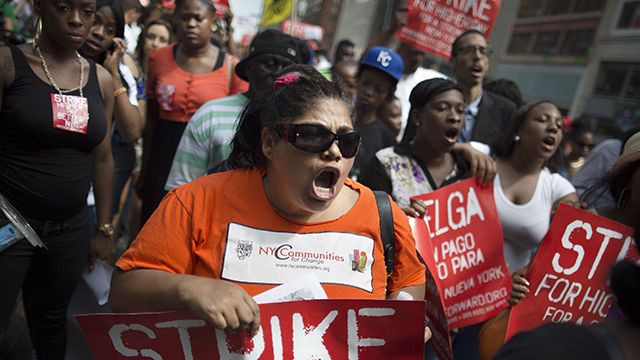We’re proud to collaborate with The Nation in sharing insightful journalism related to income inequality in America. The following post appeared first in Nation contributor Greg Kaufmann’s “This Week in Poverty” blog.

One of the obstacles to addressing poverty in this country is that too many people think of low-income people as different, flawed or less than, which often leads not only to a lack of empathy but to outright blame.
However, a new report from the Economic Policy Institute (EPI) shows just how much Americans across the economic spectrum have in common when it comes to stagnating wages.
“The bottom 99 percent may be a bit of an exaggeration but it’s not much,” said EPI president Lawrence Mishel, who co-authored A Decade of Flat Wages with economist Heidi Shierholz. “In an era when the only people moving ahead are those with an advanced degree — and that’s just 12 percent of the workforce — we shouldn’t partition off people at the low end as if they are totally distinct.”
The report demonstrates that during the recession and its aftermath, from 2007 to 2012, wages fell for the entire bottom 70 percent of workers despite productivity growth of 7.7 percent. But Mishel emphasizes that the cause of stagnating wages isn’t the recession.
“We need to be clear that these trends are really evident from 2002 to 2007, after the momentum of the strong wage growth of the late 1990s ended,” he said.
From 2000 to 2007, productivity increased by a robust 16 percent but a worker at the 50th percentile saw a wage growth of just 2.6 percent, a worker at the 20th percentile saw a wage increase of 1 percent and the 80th percentile saw a wage growth of 4.6 percent. Indeed, over the past ten years, wages were stagnant or declined for the bottom 70 percent.
“And even the wages of the worker at the 80th percentile rose only 1.7 percent over the past 10 years — that’s less than 0.2 percent annually, which in economic terms is zero, ” said Mishel. “Basically, somewhere between 80 and 90 percent of workers in the last decade aren’t getting bupkis, as my grandmother used to say.”
Mishel and Shierholz examine President Obama’s July 24 speech regarding his “Better Bargain for the Middle Class” initiative and conclude that — while he correctly identified the “severed link” between increasing productivity and rising wages for workers — he “overlooked what it will take to solve the wage problem.” The president said, “With new American revolutions in energy, technology, manufacturing, and health care, we are actually poised to reverse the forces that have battered the middle class for so long, and rebuild an economy where everyone who works hard can get ahead.”
But Mishel and Shierholz note that there is nothing about innovation that guarantees either better jobs or broad-based wage growth.
“If you really want to get wages to grow broadly for everybody it means confronting power in the workplace,” said Mishel. “Confronting the fact that we have an economy geared toward creating huge corporate profits and rising stock prices, but not rising wages, and an economy constructed to give some people power and other people less power.”
Mishel also takes issue with the common assertion by President Obama and others that education is a big part of the solution to the wage problem.
“Whatever President Obama wants to do in schools or getting more people to go to college is not going to change the fact that wages for college graduates have stagnated for 10 years,” said Mishel. “More than 25 percent of college graduates are in managerial or business occupations, and they haven’t had a wage increase in ten years. How can anyone think the answer to the wage problem is going to college?”
The report does credit President Obama with advocating for an increase in the minimum wage, and Mishel said that setting a higher wage floor is “a key part of creating momentum for getting better wages for everybody.”
“There is a spillover effect from raising the minimum wage, and those who are currently earning [just] above it will also benefit, as many employers will raise their wages too,” said Mishel.
Raising the minimum wage could also potentially have a significant effect on those living in or near poverty, although Mishel cautioned that we will still need “substantial work supports, and healthcare and retirement subsidies” to meet a decent standard of living. But a report by the D.C. Fiscal Policy Institute, for example, noted that a full-time job paying $12 to $15 an hour would lift most low-income families in Washington, D.C., above 150 percent of poverty, which is about $27,000 annually for a family of three.
Mishel believes that the wage stagnation of all workers—from the nearly 30 percent who earn poverty wages through those above the 80th percentile—“is all part of the same phenomena of employers having the upper hand, with very little protection for any group of workers.”
“There’s a multi-decade perspective that goes — first [corporations] came after the low-wage workers and middle-wage workers, and found out that wasn’t enough,” said Mishel. “So then they started going after white-collar workers. It’s only logical because if you’re really all about keeping down labor costs, ultimately a lot of the labor costs are white-collar workers — they make the most wages and there’s a whole lot of them.”
So how could we return to broad wage growth for all workers?
In addition to “aggressively increasing the minimum wage,” Mishel and Shierholz offer many recommendations, including: rapidly lowering unemployment through large-scale, ongoing public investment; restoring the collective bargaining power of low- and middle-wage workers; guestworker programs only being used to relieve documented labor shortages, and guestworkers having the same labor protections as resident workers; citizenship for undocumented workers who are currently vulnerable to exploitation; executive action so federal dollars aren’t spent employing people in jobs with poverty-level wages; and job quality and wage growth as the key priorities in economic policymaking.
“There is no economic law that says what’s going on needs to have happened or [to] continue to happen,” said Mishel. “We’re going to create lots of wealth going forward. So it’s basically a policy and political question about whether the income that is produced is shared with the vast majority. Things could be different by taking actions that we can collectively pursue, including lifting people out of poverty.”


